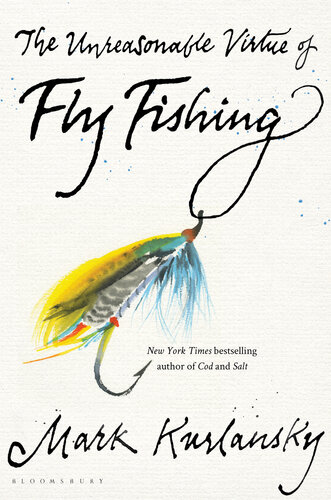
The Unreasonable Virtue of Fly Fishing
- اطلاعات
- نقد و بررسی
- دیدگاه کاربران
نقد و بررسی

January 4, 2021
Journalist Kurlansky (Salmon: A Fish, the Earth, and the History of a Common Fate) enlivens a quotidian subject in this vibrant treatise on fly-fishing. The draw of fly-fishing, Kurlansky suggests, lies in the sport’s challenging nature—it takes more patience, guile, and finesse than bait fishing. Alongside personal meditations, Kurlansky provides a wide-ranging history of fly-fishing, noting how it has featured in art, literature, and the lives of political figures. Spanish dictator Francisco Franco, for example, loved fish and protected salmon runs in the northern Spanish rivers; Herbert Hoover was “a dedicated fly fisher”; and Czech writer Ota Pavel wrote, “fishing is about freedom, most of all.” Kurlansky describes his personal draw to fly-fishing as a primordial urge, writing, “whenever I see a body of water, I look for fish.” He enlivens historical explanations with personal anecdotes, describing, for example, the history of the fishing rod as he tells the story of once fishing with an old bamboo rod that a park ranger failed to recognize as an instrument for fishing. Kurlansky captures in crisp detail his experience in nature: “That an icy river can have a warm embrace is one of nature’s ironies.” This is a thoroughly enjoyable mash-up of vivid memoir and fastidious, eccentric history.

January 15, 2021
The prolific author returns to an old love: angling for trout. "Any day fishing on a wintry river is a great day," writes Kurlansky, refuting Tolstoy's grumpy assertion that angling is "a stupid occupation." His river of choice is the appropriately named Salmon, in central Idaho, where the water flows so swiftly that Lewis and Clark named it the "River of No Return." It's not open in winter, notes the author, but there are other wintry rivers where one can test "the only two rules of fly fishing that cannot be broken: you cannot fall in and you must keep your fly in the water as much as possible. Everything else depends on circumstance." This being a book by Kurlansky, who never met a fact he didn't like, the narrative turns from his experiences as a fisherman to a more universal history. First come the fish themselves, the salmonids, which people have been harvesting for millennia. Only one of those species is a true trout, namely Salmo trutta, the brown trout, with every other kind of trout so called only because they resemble it. The author then moves on to the "acclimatization" projects of the French and the British, "an imperialist concept in an age of Empire," whereby British anglers felt it was only proper that the brown trout follow the course of conquest, which explains why it can now be found in places such as New Zealand, Chile, and South Africa, "to assure that anywhere a British colonist went, there would be good game for a fly rod." As for rods and flies, Kurlansky geeks out, reciting names that are known to this day: Charles Orvis, for one, whose contributions to the tackle box are legion; and Clarence Birdseye, the frozen-food magnate whose automatically retracting reel when a fish struck was a dismal failure since "hauling out the fish is part of fishing." Stuffed full of trivia, data, lore, and anecdote--a pleasure for any fan of trout fishing.
COPYRIGHT(2021) Kirkus Reviews, ALL RIGHTS RESERVED.

February 5, 2021
For some people, fishing is not just for food or competition: it is compulsory. Writer Kurlansky (Salmon) and others are driven towards the challenge and beauty of fly fishing. To better understand this fervor, the author gives a comprehensive history. Every piece of equipment--fly, rod, reel, line--has their own chapter. The book cites various authors, poets, thinkers, and political figures throughout, as well as Kurlansky's own experiences of fishing all over the world. Back matter includes an appendix of rivers mentioned throughout. Kurlansky's fans will enjoy sharing his passion. But unfamiliar readers may struggle to stay interested with the verbose text. Also, while the book recognizes the troubling "fraternity" past of fly fishing, it doesn't offer solutions. Fisherwomen, who get their own chapter, are praised for their accomplishments throughout time. There are more women in the fly-fishing community today, but they might find the book off-putting due to lingering attitudes, such as how "there is something feminine about casting flies." Native Americans are referenced several times as a group who distrust fly fishing, yet no references are attributed. Also, some readers will be distressed by repeated use of a slur for disability and disabled people. VERDICT The author's love of fly fishing is obvious, but this latest book is for limited audience.--Elissa Cooper, Helen Plum Memorial Lib., Lombard, IL
Copyright 2021 Library Journal, LLC Used with permission.




دیدگاه کاربران